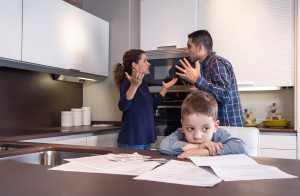 I am attending the International Academy of Collaborative Professionals 16th Annual Educational Forum in Washington, D.C. Donna Hicks, Ph.D., an associate at the Weatherford Center for International Affairs at Harvard and author of the book, “Dignity,” is our keynote speaker tomorrow night. Of course, because she works primarily in the field of international relations, much of her book is about how people who have been forced to suffer indignities, as a people or a country, are prone to more readily engage in conflict, as opposed to people who can empathize with others or see others’ perspectives because someone recognized their dignity as persons. She surprised me when she compared this to parental conflict. In her book, Hicks states that, “Listening to parents yell at each other undermines a child’s sense of security…” She went on to cite the research of Naomi Eisenberger and Matthew Lieberman when she said, “When we are psychologically injured, the area of our brain that is activated is that same area that is activated when we experience physical injury.” Hicks also cites the research of Bruce Perry, a psychiatrist and neuroscientist who is a specialist in childhood trauma, saying,”He was one of the first researchers to debunk the myth that children are naturally resilient and bounce back no matter what they suffer.” She contends, “The way we treat our children matters.”
I am attending the International Academy of Collaborative Professionals 16th Annual Educational Forum in Washington, D.C. Donna Hicks, Ph.D., an associate at the Weatherford Center for International Affairs at Harvard and author of the book, “Dignity,” is our keynote speaker tomorrow night. Of course, because she works primarily in the field of international relations, much of her book is about how people who have been forced to suffer indignities, as a people or a country, are prone to more readily engage in conflict, as opposed to people who can empathize with others or see others’ perspectives because someone recognized their dignity as persons. She surprised me when she compared this to parental conflict. In her book, Hicks states that, “Listening to parents yell at each other undermines a child’s sense of security…” She went on to cite the research of Naomi Eisenberger and Matthew Lieberman when she said, “When we are psychologically injured, the area of our brain that is activated is that same area that is activated when we experience physical injury.” Hicks also cites the research of Bruce Perry, a psychiatrist and neuroscientist who is a specialist in childhood trauma, saying,”He was one of the first researchers to debunk the myth that children are naturally resilient and bounce back no matter what they suffer.” She contends, “The way we treat our children matters.”
I have long thought that conventional wisdom about children having great resiliency is wrong. It is my belief that, in fact, children do not have much resiliency because resiliency is developed by life experiences over a long period of time. The TEDx video that I am highlighting in this article is a presentation by Tamara Afifi, who is a professor at the University of California Santa Barbara in the Department of Communication. One area of her research that she discusses in the video is the effect of conflict on children. While divorce is presumed to always have an adverse affect on children, Professor Afifi’s research indicates that rather it is the ongoing conflict, whether the parents are married or divorced, that is the greatest harm to children.
Dr. Hicks also refers to Shulamuth Koenig, director of the People’s Movement for Human Rights Learning, who she says believes, “…that it is the quality of the relationship between men and women that sets the stage for all other relationships. If children see their parents treating each other with dignity, then they will develop an imprint in their brain about how all others should be treated. The idea is worth pondering.”
In our work in Collaborative Divorce, we try to help divorcing couples learn, whether their children are 3 or 30, how to communicate more positively and co-parent effectively–in other words, with less conflict. I see children of divorce in my office who are now in their 30’s and 40’s getting divorced. Because they suffered through their own parents’ divorce, many of these clients have anguished for years over the dilemma of whether staying together is “better for their children, no matter what.” They feel that if they must divorce they desperately want their children’s experience to be different than theirs was when their parents divorced. If you or someone you know feels that they must go through a divorce, please let me or someone else who is trained in Collaborative Divorce introduce them to this different way to divorce, a way that will help the parents and the children find healing and a peaceful future. Please watch the following video and let me know your thoughts on this subject.
You can also read my previous blog, 10 Things to Remember with Children in Divorce for some tips on making the transition smoother for the kids.











